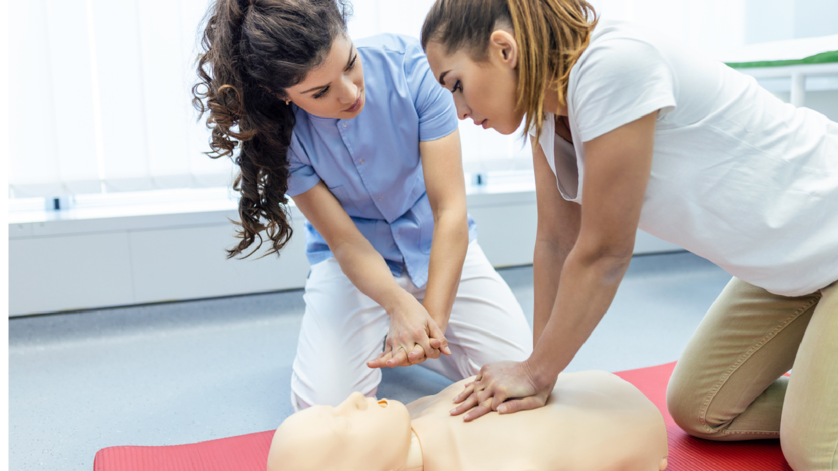Trending
Don’t ignore signs, CPR can save lives

Sudden cardiac arrest (SCA) is a prominent cause of death globally, especially in India, where it claims thousands of lives each year. The majority of cardiac arrests occur at home or in the office. Out-of-hospital cardiac arrest (OHCA) is a major public health issue, accounting for roughly 10% of global mortality. The global incidence is 55 per 100,000 person-years.Extrapolating the data to national death rates produces a realistic estimate of around 7 lakh SCD cases in India each year. One-half of all OHCA are witnessed by bystanders. The most important stage in the survival chain of OHCA is cardiopulmonary resuscitation (CPR), and recognising symptoms and signs of sudden cardiac arrest (SCA) is vital to ensuring prompt intervention. According to earlier studies, the bystander CPR rate in India ranges between 1.3% and 9.8%*.
CPR, a technique involving chest compressions and rescue breaths, can sustain blood circulation until professional help arrives. Immediate bystander intervention significantly enhances the chances of survival. Unfortunately, lack of awareness and bystander hesitancy are prevalent issues in India. Promoting SCA and CPR awareness can empower individuals to respond effectively during emergencies, potentially saving lives. Public health initiatives, educational campaigns, and widespread training programs are essential to foster a culture of preparedness and increase the likelihood of positive outcomes in cases of sudden cardiac arrest.
In a compelling and informative panel discussion telecasted on Times of India's Facebook Live, three distinguished cardiologists took centre stage to shed light on the importance of CPR (Cardiopulmonary Resuscitation) in saving lives during emergencies. To bring public awareness and education about SCA and CPR (Cardiopulmonary Resuscitation), which can save lives in emergencies, the Cardiological Society of India (CSI), in association with SATs Academy, has launched CALS – A CPR as a Life Skill Initiative, supported by the Making India Heart Strong, a patient awareness initiative by Sun Pharma.
Dr Gurpreet S Wander, Chief Cardiologist and Member of Cardiological Society of India, emphasised the importance of Basic Cardiac Life Support (BCLS) being administered by the general public. He clarified that while advanced cardiac life support is reserved for medical facilities, anyone can and should learn BCLS. The steps involved in BCLS include first checking if a person has a pulse and is breathing. The subsequent steps include hands-on CPR procedures, particularly chest compressions. Dr Wander stressed the need for widespread CPR training, asserting that it is a skill that everyone can acquire.
Dr. P. C. Rath, present Cardiological Society of India, Hyderabad, delved into the specific actions to be taken when a person collapses due to sudden cardiac arrest (SCA). According to him, the protocol involves 30 chest compressions followed by 2 rescue breaths. The compression rate is critical, with Dr Rath stressing that it should be maintained between 100-120 compressions per minute. By highlighting the importance of these precise actions, Dr Rath provided a clear guideline for individuals who might find themselves in a situation where immediate CPR is required. His insights into the sequence of chest compressions and rescue breaths serve as a valuable resource for those seeking to acquire or enhance their CPR skills.
Dr Gurpreet S Wander, a Member of the Cardiological Society of India, expressed a resounding endorsement for CPR training as a fundamental life skill. Recognising the undeniable value of Cardiopulmonary Resuscitation in saving lives during emergencies, particularly cardiac arrests, Dr Bhandari advocated for its inclusion in various settings. According to Dr Bhandari, CPR training should extend beyond schools to workplaces and communities. He emphasised that high school students, hospital staff, and even airport personnel should undergo CPR training. Dr. Bhandari argued that possessing CPR skills increases the likelihood of individuals responding effectively in emergencies, potentially saving lives before professional help arrives.
The panel discussion on "Restart a Heart: Be a Heart Hero!!! Learn CPR" facilitated a deep dive into the world of cardiac resuscitation, guided by the expertise of Dr. P. C. Rath, Dr. Suman Bhandari, and Dr. Gurpreet S Wander. Their responses underscored the accessibility and importance of CPR training for the general public. As the experts unanimously agreed, CPR is not just a medical procedure; it is a fundamental life skill that should be taught and embraced across schools, workplaces, and communities. The insights shared during the discussion serve as a clarion call for widespread CPR education, empowering individuals to become true Heart Heroes in times of crisis.
Ref:
*Patel, Hiren, et al. “Outcomes of Out of Hospital Sudden Cardiac Arrest in India: A Review and Proposed Reforms.” Indian Heart Journal, vol. 321–326, no. 5, 1 Sept. 2023, https://doi.org/10.1016/j.ihj.2023.08.005.
Disclaimer: The views and opinions expressed in the story are independent professional judgments of the doctors/experts, and TIL does not take any responsibility for the accuracy of their views. This should not be considered a substitute for medical advice. Please consult your treating physician for more details. This article has been produced on behalf of Sun Pharma by Times Internet’s Spotlight team.
CPR, a technique involving chest compressions and rescue breaths, can sustain blood circulation until professional help arrives. Immediate bystander intervention significantly enhances the chances of survival. Unfortunately, lack of awareness and bystander hesitancy are prevalent issues in India. Promoting SCA and CPR awareness can empower individuals to respond effectively during emergencies, potentially saving lives. Public health initiatives, educational campaigns, and widespread training programs are essential to foster a culture of preparedness and increase the likelihood of positive outcomes in cases of sudden cardiac arrest.
In a compelling and informative panel discussion telecasted on Times of India's Facebook Live, three distinguished cardiologists took centre stage to shed light on the importance of CPR (Cardiopulmonary Resuscitation) in saving lives during emergencies. To bring public awareness and education about SCA and CPR (Cardiopulmonary Resuscitation), which can save lives in emergencies, the Cardiological Society of India (CSI), in association with SATs Academy, has launched CALS – A CPR as a Life Skill Initiative, supported by the Making India Heart Strong, a patient awareness initiative by Sun Pharma.
Dr Gurpreet S Wander, Chief Cardiologist and Member of Cardiological Society of India, emphasised the importance of Basic Cardiac Life Support (BCLS) being administered by the general public. He clarified that while advanced cardiac life support is reserved for medical facilities, anyone can and should learn BCLS. The steps involved in BCLS include first checking if a person has a pulse and is breathing. The subsequent steps include hands-on CPR procedures, particularly chest compressions. Dr Wander stressed the need for widespread CPR training, asserting that it is a skill that everyone can acquire.
Dr. P. C. Rath, present Cardiological Society of India, Hyderabad, delved into the specific actions to be taken when a person collapses due to sudden cardiac arrest (SCA). According to him, the protocol involves 30 chest compressions followed by 2 rescue breaths. The compression rate is critical, with Dr Rath stressing that it should be maintained between 100-120 compressions per minute. By highlighting the importance of these precise actions, Dr Rath provided a clear guideline for individuals who might find themselves in a situation where immediate CPR is required. His insights into the sequence of chest compressions and rescue breaths serve as a valuable resource for those seeking to acquire or enhance their CPR skills.
Dr Gurpreet S Wander, a Member of the Cardiological Society of India, expressed a resounding endorsement for CPR training as a fundamental life skill. Recognising the undeniable value of Cardiopulmonary Resuscitation in saving lives during emergencies, particularly cardiac arrests, Dr Bhandari advocated for its inclusion in various settings. According to Dr Bhandari, CPR training should extend beyond schools to workplaces and communities. He emphasised that high school students, hospital staff, and even airport personnel should undergo CPR training. Dr. Bhandari argued that possessing CPR skills increases the likelihood of individuals responding effectively in emergencies, potentially saving lives before professional help arrives.
The panel discussion on "Restart a Heart: Be a Heart Hero!!! Learn CPR" facilitated a deep dive into the world of cardiac resuscitation, guided by the expertise of Dr. P. C. Rath, Dr. Suman Bhandari, and Dr. Gurpreet S Wander. Their responses underscored the accessibility and importance of CPR training for the general public. As the experts unanimously agreed, CPR is not just a medical procedure; it is a fundamental life skill that should be taught and embraced across schools, workplaces, and communities. The insights shared during the discussion serve as a clarion call for widespread CPR education, empowering individuals to become true Heart Heroes in times of crisis.
Ref:
*Patel, Hiren, et al. “Outcomes of Out of Hospital Sudden Cardiac Arrest in India: A Review and Proposed Reforms.” Indian Heart Journal, vol. 321–326, no. 5, 1 Sept. 2023, https://doi.org/10.1016/j.ihj.2023.08.005.
Disclaimer: The views and opinions expressed in the story are independent professional judgments of the doctors/experts, and TIL does not take any responsibility for the accuracy of their views. This should not be considered a substitute for medical advice. Please consult your treating physician for more details. This article has been produced on behalf of Sun Pharma by Times Internet’s Spotlight team.
End of Article
FOLLOW US ON SOCIAL MEDIA









